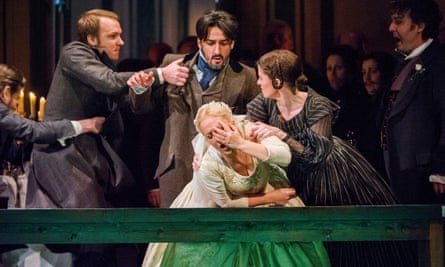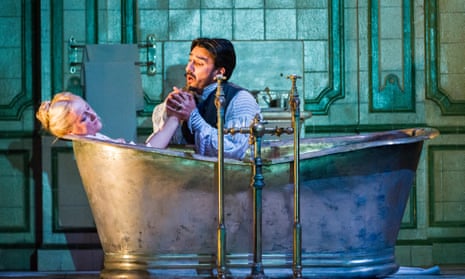Katie Mitchell’s new production of Lucia di Lammermoor updates Donizetti’s tragedy from the aftermath of the 1688 Revolution to the 1830s, the time of composition, and transforms it into an examination of early Victorian gender politics and the contemporaneous rise of feminism.
Donizetti presents his mentally unstable heroine as a passive victim of sectarian division. Mitchell, however, argues that there are “gaps” in the work’s narrative and psychology: we neither see Lucia’s murderous wedding night, nor are we told precisely what drives her to kill, nor indeed how she dies. Mitchell consequently plays down the political background and reimagines the opera’s heroine as a self-determining, independent woman destroyed by male conservatism and aggression.
A much-publicised sex scene shows Diana Damrau’s Lucia contented in her relationship with Charles Castronovo’s Edgardo. When forced by Enrico (Ludovic Tézier) into marrying Arturo (Taylor Stayton), she reacts with anger and bitter resentment rather than timid acquiescence. The murder, now shown, is an act of desperate calculation, and it is the miscarriage of her child with Edgardo that ultimately pushes her over the edge.

Though undeniably powerful in places – the last 40 minutes are unforgettable – this is ultimately a version of the opera rather than an interpretation, and the stagecraft can be over-complicated. Vicki Mortimer’s designs split each scene in two, allowing Mitchell both to confront us with parallel narratives throughout, and to bring on stage material that Donizetti leaves off it. But the result is as much distracting as illuminating, above all in the juxtaposition of the murder and the formidable performance of the Wolf’s Crag duet.
It’s superbly acted and sung, though Damrau took a while to get into her stride on opening night, compensating for some tentative moments early on with a beautifully delivered mad scene in which every phrase carried deep psychological resonance. Tézier is wonderfully stiff-backed and implacable. Castronovo sounds glorious from start to finish. It’s a shame that Daniel Oren’s conducting is routine and indifferent throughout.

Comments (…)
Sign in or create your Guardian account to join the discussion